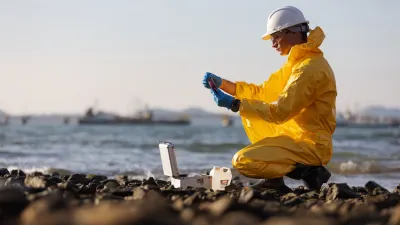A recent article presents the findings of a study examining the question of how humans will assign or cope with blame for collisions caused by self-driving cars. The findings present insight on how humans will interact with technology in the future.

Adam Waytz details the method and findings of research into the reactions of test subjects to self-driving cars: "people’s responses to driving an autonomous car suggests that people are exceedingly willing to grant these cars’ humanlike intelligence, and the more humanlike features the car conveys—when the car possesses a name, voice, and gender—the more people trust it to operate competently, as a human driver would."
The article repeatedly references a morbid juxtaposition behind the dehumanizing aspects of war and the humanizing rituals of test subjects after they experience collisions in self-driving cars. Here's why the comparison matters: "Beyond addressing questions about how we will assign blame to the autonomous nonhumans of tomorrow (insurance companies are surely taking notes), these findings also give insight into the inverse process of dehumanization. Just as the mere addition of a voice and gender leads people to treat the car as humanlike, when we fail to perceive these features in other people, we are more likely to treat them as mindless objects."
FULL STORY: Seeing Human

Planetizen Federal Action Tracker
A weekly monitor of how Trump’s orders and actions are impacting planners and planning in America.

Canada vs. Kamala: Whose Liberal Housing Platform Comes Out on Top?
As Canada votes for a new Prime Minister, what can America learn from the leading liberal candidate of its neighbor to the north?

USGS Water Science Centers Targeted for Closure
If their work is suspended, states could lose a valuable resource for monitoring, understanding, and managing water resources.

House Moves to Rescind California’s Emissions Standards
The state has been allowed to set its own emissions goals, including a mandate to transition to electric or zero-emissions vehicles by 2035.

Portland Proposal Would Suspend Development Fees to Spur Housing Construction
Oregon Gov. Tina Kotek and Portland Mayor Keith Wilson announced their policy plan Thursday, with the goal to jumpstart housing construction.

Honolulu Community College Celebrates Culture and Sustainability
Honolulu Community College brought together more than 320 students, staff, and community members for a day of Hawaiian cultural activities, music, and sustainability-focused learning at its annual Hoʻolauleʻa celebration.
Urban Design for Planners 1: Software Tools
This six-course series explores essential urban design concepts using open source software and equips planners with the tools they need to participate fully in the urban design process.
Planning for Universal Design
Learn the tools for implementing Universal Design in planning regulations.
New York City School Construction Authority
Village of Glen Ellyn
Central Transportation Planning Staff/Boston Region MPO
Chaddick Institute at DePaul University
Institute for Housing and Urban Development Studies (IHS)
City of Grandview
Regional Transportation Commission of Southern Nevada
Toledo-Lucas County Plan Commissions


























